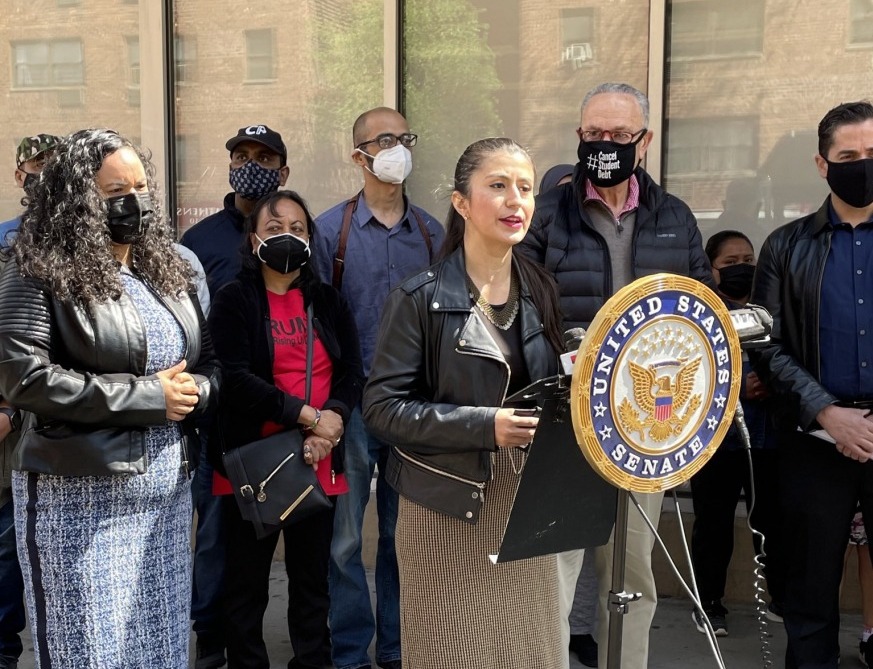
U.S. Sen. Chuck Schumer, State Sen. Jessica Ramos and Assembly Member Carmen De La Rosa rallied outside an IRS office building in LeFrak City Friday (Sen. Jessica Ramos via Twitter)
May 3, 2021 By Allie Griffin
A number of undocumented workers who were unemployed during the pandemic face obstacles in tapping into a $2.1 billion state fund that was recently established to help them.
Many lack a tax identification number that is issued by the IRS — which is one way they can prove eligibility for the fund. The IRS, however, has been slow to issue such IDs due to a backlog in their system, according to area officials.
Several New York legislators are concerned that the backlog will hurt undocumented workers and are calling on the IRS to speed up the process.
U.S. Sen. Chuck Schumer, State Sen. Jessica Ramos and Assembly Member Carmen De La Rosa rallied outside an IRS office building in LeFrak City Friday to demand the agency clear the backlog so immigrants can take advantage of the state’s Excluded Workers Fund that is about to be launched.
The $2.1 billion fund will provide payments of up to $15,600 to undocumented New Yorkers who lost their jobs during the pandemic and didn’t qualify for federal aid. Undocumented immigrants have been ineligible to receive financial support from federal relief programs — like unemployment insurance and stimulus checks — due to their immigration status.
An estimated 290,000 undocumented workers across the state are expected to benefit from this relief, including 213,000 individuals in New York City alone.
There are 58,000 Queens residents who will be eligible to receive funds once applications for the program open, according to Fiscal Policy Institute.
The fund requires applicants to prove they’ve paid taxes in at least one of the last three reporting years. One way applicants can prove this is with an Individual Taxpayer Identification Number (ITIN), which the IRS provides to undocumented immigrants and others who don’t have a social security number to file taxes.
The legislators said there is a nationwide backlog of 74,000 applicants — including an estimated 4,000 in New York — for an ITIN at the IRS.
Schumer, Ramos and De La Rosa also penned a letter to IRS Commissioner, Charles Rettig, to demand the agency expedite the processing of the applications so that such New Yorkers can get financial relief as soon as possible.
“In order to ensure that the maximum amount of workers can benefit from the Excluded Workers Fund, it is imperative that the IRS prioritize its resources to work expeditiously through this ITIN application backlog,” they wrote.
The ITIN applications are currently taking upwards of 17 weeks to process, according to the National Immigration Law Center.
The lawmakers are demanding that the IRS expand the number of its Taxpayer Assistance Centers—which assist workers with the ITIN application—in the city and increase the working hours of the centers.
They also requested the IRS dedicate more staff and resources to tackling the backlog.
“We passed historic relief in New York for these excluded workers,” Ramos said at the rally. “Now we need to make sure they can access these programs by expediting the ITIN process.”
